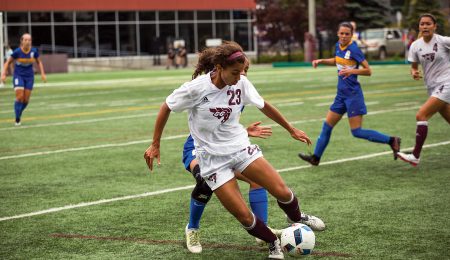Managing void created by students’ abrupt departure will require “Herculean efforts”
Saudi Arabian students at the University of Ottawa have found themselves caught in the crossfire of an ongoing diplomatic dispute between Canada and their country of origin. One of a handful of measures enacted by the Saudi government is the order moving all students studying in Canada on government-funded scholarships out of the country.
The initial deadline for Saudi students to leave Canada was originally reported as Aug. 31. However, a statement released by the Saudi Arabian Cultural Bureau, which manages Saudi students in Canada, on Aug. 23 announced an extension to Sept. 22.
Saudi students who pay for their own education do not appear to be impacted by the dispute at this time. Meanwhile, students studying under government-funded scholarships are being transferred to different post-secondary institutions across the world or returning home.
The conflict erupted on Aug. 2, when Canada’s Minister of Foreign Affairs, Chrystia Freeland, sent out a tweet calling for the release of two Saudi women’s rights activists.
Very alarmed to learn that Samar Badawi, Raif Badawi’s sister, has been imprisoned in Saudi Arabia. Canada stands together with the Badawi family in this difficult time, and we continue to strongly call for the release of both Raif and Samar Badawi.
— Chrystia Freeland (@cafreeland) August 2, 2018
The following day, Global Affairs Canada voiced its concerns on Twitter, urging the Saudis to “immediately release” the activists and all other peaceful human rights advocates.
Canada is gravely concerned about additional arrests of civil society and women’s rights activists in #SaudiArabia, including Samar Badawi. We urge the Saudi authorities to immediately release them and all other peaceful #humanrights activists.
— Foreign Policy CAN (@CanadaFP) August 3, 2018
On Aug. 5 the Saudi government responded in a series of tweets spelling out a list of retaliations for criticizing the country’s human rights record, including expelling the Canadian ambassador, suspending new trade and investment transactions, and forcing Saudi students studying under the King Abdullah Scholarship Program (KASP) to leave Canada.
https://twitter.com/KSAmofaEN/status/1026241367922696192
KASP covers tuition, language lessons and health insurance for Saudi international students.
There are 246 Saudi students enrolled at the U of O according to Véronique Valleé, spokesperson for the university. Of these students, 132 are in graduate studies, primarily engineering, science and medicine.
The U of O is home to the most Saudi students in the capital region , with 130 Saudi students enrolled at Carleton University and 74 at Algonquin College for the fall semester. Ten of those at Algonquin do not study under KASP.
“Like all other Canadian universities, the U of O is monitoring the situation very closely,” Valleé said. “Our primary concern is the wellbeing of students,” and “we are currently assessing the impact of a potential withdrawal of students coming from Saudi Arabia.”
Concerns are especially high surrounding healthcare. Many Saudi students are training at the U of O’s medical school and doctors have warned that their quick and unexpected departure could pose problems for local hospitals.
In an article published on LinkedIn, Frank Rybicki, professor and chair of the Department of Radiology at the U of O, asked the Saudi government to consider pushing the deadline for departure to mid-October. He said at the U of O, there are almost 80 Saudi medical residents and clinical fellows.
“Disrupting the training for young Saudi physicians is heartbreaking for most, and stressful for all,” Rybicki wrote. “Finding the proper human resources to manage the void created by the departure of our Saudi trainees will take Herculean efforts.”
According to a statement from the Council of Ontario Universities emailed to the Fulcrum, close to 9,500 students from Saudi Arabia studied in Canada as of last year. One in five of them in Ontario, meaning that Saudi Arabian students compose the fifth largest group of international students in Ontario, following China, India, Nigeria and the United States.
The statement also notes that “there is a financial loss in the recall of Saudi students to Ontario universities of tens of millions of dollars.” According to an education report released by Global Affairs Canada, the average annual tuition cost for international undergraduate students was over $22,000 in 2015, while the cost for international graduate students was close to $15,000.
The Saudi Arabian Cultural Bureau did not respond to the Fulcrum’s requests for comment by the time of publication. This story will be updated as necessary.





